|
|
|
Sort Order |
|
|
|
Items / Page
|
|
|
|
|
|
|
| Srl | Item |
| 1 |
ID:
055595
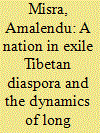

|
|
|
| 2 |
ID:
103423
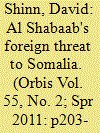

|
|
|
|
|
| Publication |
2011.
|
| Summary/Abstract |
This article focuses on the threat to Somalia by al Shabaab (The Youth), an extremist organization that controls most of southern and central Somalia. It learned its strategy and tactics from al Qaeda and the Taliban and relies heavily on a relatively small number of foreign fighters, most of whom are Somalis with foreign passports from the large Somali diaspora. The non-Somali contingent probably numbers only about 200 to 300, although it brings battlefield experience from Afghanistan and Iraq and provides al Shabaab with expertise in bomb making, remote-controlled explosions, suicide bombing and assassinations. Some of the foreigners occupy key positions in al Shabaab. The connection between al Shabaab and al Qaeda is growing stronger but has not yet reached the level of operational control by al Qaeda. Al Shabaab's draconian tactics, which are imported from outside and are anathema to most Somalis, and its foreign component may be its undoing.
|
|
|
|
|
|
|
|
|
|
|
|
|
|
|
|
| 3 |
ID:
157913
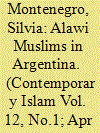

|
|
|
|
|
| Summary/Abstract |
This article examines contemporary aspects of the identity construction of the ‘Alawi diaspora in Argentina. In the local context, the preservation of ‘Alawi singularity has so far been a key element in the group’s identity. The strategies for integration as legitimate Muslims in the wider Islam and the closeness to Shi’ism are relatively independent of how these processes took place in the homeland. I first describe the geography of the diaspora in Argentina, comprising the spaces and institutions where descendants settled all over the country. I analyze the factors that helped keep the nodes connected and I will demonstrate that these constitute a center/periphery logic for communities concerning the alleged degrees of preservation of the culture of origin they symbolize. I will try to show that ‘Alawis integrated into the diversity of Islam in Argentina while preserving their sectarian borders and, at the same time, stressing an “Arab” identity. I argue that these strategies should be understood in the local arena of an intra-Islamic pluralism that constitutes Muslim presence in Argentina, where the dynamics of sectarianisms assume idiosyncratic characteristics. Finally, I will show institutional closeness to Shi’ism as a recent development, promoted by the common political stance of both groups on the conflict in Syria. We will see that this closeness does not imply the dissolution of doctrinal boundaries between Shi’is and ‘Alawis and that it involves a redefinition of the diaspora in terms of increasingly claiming a Syrian national origin.
|
|
|
|
|
|
|
|
|
|
|
|
|
|
|
|
| 4 |
ID:
120703
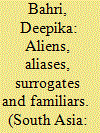

|
|
|
|
|
| Publication |
2013.
|
| Summary/Abstract |
In this essay, I argue that alienation and familiarity serve as mobile matrices for understanding the affectively experienced impact of transnational migration in certain of Jhumpa Lahiri's short stories. While we may think of alienation as a precondition of migrant identity, it is a condition that is familiar to most of us in different contexts. How does alienation, thus plurally conceived, figure in the experience of migrants, producing the relay between heimlich/unheimlich experiences? Moreover, in the socio-cultural context of globalisation, how does transnational migration challenge conventional notions of family, a word associated with notions of familiarity and filiation that are seemingly antonymous to the idea of alienation? These are the questions I set out to answer, concluding that the 'family' is always a unit composed by its very hauntings, surrogates, and absences.
|
|
|
|
|
|
|
|
|
|
|
|
|
|
|
|
| 5 |
ID:
091228
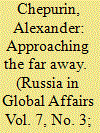

|
|
|
| 6 |
ID:
181871
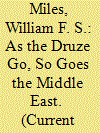

|
|
|
|
|
| Summary/Abstract |
The Druze, despite being a small minority faith group, have long survived in a challenging region, thanks in part to a doctrine of deference to whatever state they live in. In the past few years, however, the three largest Druze populations—in Israel, Lebanon, and Syria—have each faced some of their most difficult challenges yet, from a downgrading of their citizenship status to economic collapse and civil war. An increasingly active diaspora has emerged as an important advocate for Druze interests worldwide.
|
|
|
|
|
|
|
|
|
|
|
|
|
|
|
|
| 7 |
ID:
122643
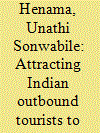

|
|
|
|
|
| Publication |
2013.
|
| Summary/Abstract |
South Africa in the post-1994 era has experienced phenomenal growth in foreign tourism. The Tourism White Paper (1996) had noted that South Africa missed its tourism opportunity because of the country's troubled past. The rapid economic growth experienced by the BRICS countries has changed the face of international tourism. The tourism destinations have moved from developed to developing countries. In this context, the article highlights that South Africa enjoys 2.6 per cent of the lucrative Indian outbound tourism market. This market share has the potential to be increased. India has been added to South African Tourism's (SAT's) Core Markets List. A longitudinal analysis from foreign arrivals indicates two things, one, that India remains the top Asian foreign arrivals country, represented by 71,587 arrivals in 2010, and two, that India remains resilient to hold to its number one spot in Asian foreign arrivals to South Africa. South Africa must gear itself up to encourage the trend.
|
|
|
|
|
|
|
|
|
|
|
|
|
|
|
|
| 8 |
ID:
118425
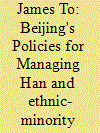

|
|
|
|
|
| Publication |
2012.
|
| Summary/Abstract |
The overseas Chinese (OC) form a vast network of powerful interest groups and important political actors capable of shaping the future of China from abroad by transmitting values back to their ancestral homeland (Tu 1991). While the Chinese Communist Party (CCP) welcomes and actively seeks to foster relations with the OC in order to advance China's national interests, some cohorts may be hostile to the regime. In accordance with their distinct demographic and ethnic pro-files, the CCP's qiaowu (??, OC affairs) infrastructure serves to entice, co-opt, or isolate various OC groupings. This article summarises the policies for managing different subsets of OC over the past three dec-ades, and argues that through qiaowu, the CCP has successfully unified cooperative groups for China's benefit, while preventing discordant ones from eroding its grip on power.
|
|
|
|
|
|
|
|
|
|
|
|
|
|
|
|
| 9 |
ID:
101987
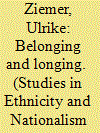

|
|
|
|
|
| Publication |
2010.
|
| Summary/Abstract |
This paper examines the question of long-distance nationalism and Armenian youth in contemporary Russia. It contributes to existing debates on diasporic cultural identities and shows that long-distance nationalism is not simply an elite-driven phenomenon, but involves complex cultural, political, and symbolic processes and practices. Drawing on data obtained during six months of ethnographic fieldwork amongst Armenian youth in the city of Krasnodar, Southern Russia, it will be shown that young Armenians exhibit aspects of diasporic long-distance nationalism in different ways. While young Armenian men hold on to cultural traditions and practices that are formed in the past, female research participants have started to challenge them.
|
|
|
|
|
|
|
|
|
|
|
|
|
|
|
|
| 10 |
ID:
087516
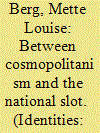

|
|
|
|
|
| Publication |
2009.
|
| Summary/Abstract |
Although cosmopolitanism used to be associated with Western, elite practices, it has in recent years been used to describe a wider array of practices by non-elite and non-Western groups. This article explores the cosmopolitanism of Cuba's "children of the revolution" living in Spain. They are those now young adults who were born in Cuba after the revolution and who were brought up to become the socialist New Man. Theirs was a world of socialist cosmopolitanism, which simultaneously was infused with commitment to a national, territorially-based political project: an independent, socialist Cuba. However, some of these New Men and New Women now embrace ideals of cosmopolitan individualism rather than the patriotic socialism with which they were inculcated as children. Yet the cultural tools that the children of the revolution make use of in their practices and narratives of cosmopolitanism paradoxically point back to revolutionary Cuba. The article argues that cosmopolitanism as a lived practice owes to experiences within the Cuban socialist-national project and is in effect a response to the ineffectiveness of this project, not necessarily a substantive opposition to it. Social capital and habitus deriving from Cuban socialism gave the children of the revolution the desire to attain cosmopolitanism as part of their life-projects. This finding suggests that the relationship between nationalism and cosmopolitanism needs further rethinking.
|
|
|
|
|
|
|
|
|
|
|
|
|
|
|
|
| 11 |
ID:
111512


|
|
|
|
|
| Publication |
2012.
|
| Summary/Abstract |
In May 2009, Sri Lankan government armed forces defeated the Liberation Tigers of Tamil Eelam (LTTE) after more than a quarter of a century of civil war. With the elimination of most of the LTTE leadership and the waning of its hold over Tamils in Sri Lanka and abroad, the scene was set for a transformation of relations between the diaspora and those at home. It is the dynamics of this transformation that we explore in this article, which traces the shifting centre of gravity in Tamil politics between actors in the homeland and those in the diaspora. Drawing on Bourdieu's notion of a 'political field', we characterise what we call the local, diasporic and transnational political fields in the Sri Lankan setting. This article shows how the LTTE's power derived largely from its control of the transnational political field, including in places that were otherwise isolated from diasporic connections. The defeat in 2009 fundamentally changed the dynamics of transnational politics by greatly weakening the LTTE's grip over the transnational political field, and this article explores the new dispensation that is now unfolding.
|
|
|
|
|
|
|
|
|
|
|
|
|
|
|
|
| 12 |
ID:
085984
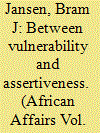

|
|
|
|
|
| Publication |
2008.
|
| Summary/Abstract |
Resettlement to third countries is regarded as a durable solution to refugee crises. In Kakuma refugee camp in north-west Kenya, seeking a better life in industrialized countries has become a preoccupation for many refugees. In this article the effects of the practice of third country resettlement on the camp population are explored. Increased ease of communication with the diaspora, expanded knowledge of entitlements, and the high visibility of resettlement processing within the camp have increased the demand for resettlement. The article argues that the result is an environment that encourages refugees to cheat through claiming insecurity and negotiating vulnerability. Refugees come to believe that resettlement is something that can be actively achieved, rather than a benefit extended only to the genuinely vulnerable
|
|
|
|
|
|
|
|
|
|
|
|
|
|
|
|
| 13 |
ID:
073442
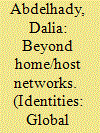

|
|
|
|
|
| Publication |
2006.
|
| Summary/Abstract |
This article draws on postcolonial understandings in order to offer a sociological analysis of Lebanese immigrants in Montreal, New York City and Paris. I argue that the concept of diaspora provides a framework for understanding the contradictory aspects of Lebanese immigrant experiences, as some immigrants may undergo a process of assimilation while others continue to hold on to their ethnic identities. Investigating Lebanese immigrant communities as a diaspora leads to the understanding of the ways immigrants construct solidarities that include their homeland, host societies, and the larger diaspora community in various parts of the world. As an analytical framework, "diaspora" incorporates multiple loyalties and attachments that are integral to processes of international migration. Thus, the framework of diaspora promises significant contributions to the understanding of the complex dynamics involved in migration and globalization.
|
|
|
|
|
|
|
|
|
|
|
|
|
|
|
|
| 14 |
ID:
181338
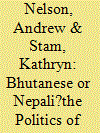

|
|
|
|
|
| Summary/Abstract |
For the group of Nepali-speaking refugees who fled Bhutan in the early 1990s, there exists no consensus ethnonym, but rather multiple terms—‘Nepali’, ‘Bhutanese’ and ‘Lhotshampa’. Based on a mixed methods approach, this article addresses the politics of ethnonym ambiguity by contextualising current naming practices within the group’s legacy of displacement as migrants in Bhutan and refugees in Nepal. In resettlement in the United States, refugees translate this legacy into strategic identification with both Bhutan and Nepal as a form of negotiation with new contexts of ambiguity conditioned by the politics of ‘deserving-ness’, racialisation and diaspora.
|
|
|
|
|
|
|
|
|
|
|
|
|
|
|
|
| 15 |
ID:
128146
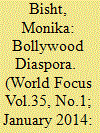

|
|
|
|
|
| Publication |
2014.
|
| Summary/Abstract |
The liberalization and the forces of globalization enhance the employment options, expansion of service sector and demand of skills across the borders. With this liberalization of the economy, a growing number of NRIs primarily from the United States and United Kingdom have also begun investing in their cultural homeland (Pulkit Datta: 2008). The aspiration of better lives and employment opportunities expanded the size of middle class abroad during 1990s, the terms "Non Resident Indian" emerged for the Indian who is living abroad. This is why; this period can be considered as the Golden Age of the NRI, which resulted the emerging middle class and the new material aspirations of an India in the midst of economic liberalization (Ingrid Thewath:2010).
|
|
|
|
|
|
|
|
|
|
|
|
|
|
|
|
| 16 |
ID:
104305
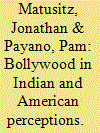

|
|
|
|
|
| Publication |
2011.
|
| Summary/Abstract |
This analysis compares Indian and US perceptions of Bollywood. It is the first to provide such a comparison. Overall, the authors found that both Indian and US perceptions of Bollywood are positive and negative. On some dimensions, Indian and US perceptions differ sharply from each other; on other dimensions, a few similarities become apparent. Overall, Indian perceptions of Bollywood are both negative and positive. While their concept of Bollywood is perceived as demeaning, stereotyping of the Muslim culture, and alienating economically and culturally marginalised audiences, it is also recognised as treasuring India's national identity, portrayal of women in some circles (e.g., alcoholics attempting to become accepted into the chic and alluring society), Hindi traditional lifestyles, and lighthearted humor. While the Bollywood phenomenon has permeated many cultures worldwide, these cultures still differ in the way they perceive this rising Indian movie industry. Not only does this analysis serve to demonstrate many lessons in cross-cultural understanding; it also corroborates the fact that Bollywood embodies an emerging socio-economic current of globalisation. It is one of the largest movie industries in the world, producing about 1,000 movies a year, and it has heavily influenced Hollywood and other Western movie markets.
|
|
|
|
|
|
|
|
|
|
|
|
|
|
|
|
| 17 |
ID:
121105


|
|
|
|
|
| Publication |
2013.
|
| Summary/Abstract |
The globalisation of Hindi cinema is a topical issue in current media and film research. Whereas the majority of previous studies on Indian film in diaspora have been concerned with issues of audiences and text, this article concentrates on the structural patterns of Hindi film, specifically in the Belgian city of Antwerp. It is inspired by insights from political economy studies which acknowledge the balance of power and global dynamics from a local perspective. Using distribution and exhibition analyses based on interviews, surveys and archival research, this study examines Hindi cinema's tracks towards (selection and distribution) and through (promotion and exhibition) the city, mainly in multiplex theatres. These analyses adopt a historical approach and reconstruct how the exclusive film culture of one community has been transformed into a more elaborate commercial enterprise, revealing both continuity and change in power relations, public, urban and transnational spaces as well as audience management. This study demonstrates the dependency of a diasporic film culture on the greater context of global cinema history, and the way in which peripheral marketplaces such as Antwerp are becoming increasingly subject to transnational corporations and their strategies.
|
|
|
|
|
|
|
|
|
|
|
|
|
|
|
|
| 18 |
ID:
191118
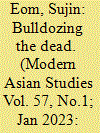

|
|
|
|
|
| Summary/Abstract |
This article looks at lawsuits surrounding two Chinese cemeteries in the mid-twentieth century South Korean cities of Incheon and Seoul as crucial sites to examine the post-colonial legal construction of national citizenry based on property rights. While different legal rationales were employed in each case, the two Chinese cemeteries were relocated to the periphery of each city as a consequence of the litigation. In Incheon, it was argued that the cemetery was owned by Chinese nationals whose land rights were ambiguous and hence open to question, both during the colonial and post-colonial period. On the other hand, in Seoul, rights to the cemetery were at stake due to its association with Japanese nationals, whose holdings were regarded as ‘enemy properties’ in the post-colonial years. Not only were the lawsuits symbolic events that foreshadowed the displacement of Chinese residents from what was considered to be Korea's national land, they also revealed an operative ambiguity in the post-colonial legal system, readily exploited as a tool for discrimination. Drawing upon an analysis of these cases, I argue that the Chinese cemeteries served as a reminder that uncertainty and ambiguity were on tap in the legal workings of post-colonial society, manifested in blunt efforts to define its legitimate members and dictate who is entitled to be buried within a nation's borders.
|
|
|
|
|
|
|
|
|
|
|
|
|
|
|
|
| 19 |
ID:
101752
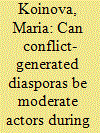

|
|
|
|
|
| Publication |
2011.
|
| Summary/Abstract |
Conflict-generated diasporas are considered likely to maintain radical behaviours. This article seeks to explain why and how they nevertheless adopt moderate claims, especially when advocating highly sensitive issues such as state sovereignty. Focusing on groups in the US I investigate the Lebanese diaspora linked to the pro-sovereignty movement in Lebanon (2000-2005) and the Albanian diaspora linked to Kosovo's independence movement (1999-2008). The contentious episodes take place during the original homeland's post-conflict reconstruction. Embedded in the literatures on diasporas, conflicts, and transnational social movements, this article argues that instrumental approach towards the achievement of sovereignty explains why conflict-generated diasporas adopt moderate behaviours. Diasporas hope that by linking their claims to a global political opportunity structure of 'liberalism' they 'play the game' of the international community interested in promoting the liberal paradigm, and thus expect to obtain its support for the legitimisation of their pro-sovereignty goals. Diaspora entrepreneurs advance their claims in a two-step process. Initially they use frame bridging and frame extension to formulate their existing grievances. Then, an increased responsiveness from their host-state emerges to sustain their initial moderation. While individuals or groups in diaspora circles occasionally issue threats during the contentious episodes, the majority in the diaspora consider moderate politics as their dominant behaviour.
|
|
|
|
|
|
|
|
|
|
|
|
|
|
|
|
| 20 |
ID:
128206
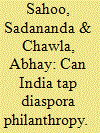

|
|
|
|
|
| Publication |
2014.
|
| Summary/Abstract |
International migration and diaspora has been one of the integral parts of the recent development discourse in academics as well as the policy domain, especially in the context of developing countries. Diaspora is seen as one of the emerging development actors as diaspora is perceived as creating economic, social and political capital through global network (Gaillard 1991, Meyer Brown 1999). Multilateral organizations have taken note of the significance of diasporic contribution towards the global development.
|
|
|
|
|
|
|
|
|
|
|
|
|
|
|
|
|
|
|
|
|